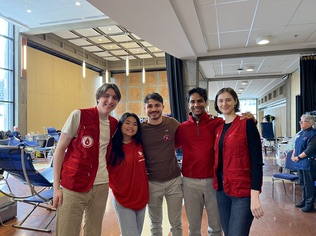On March 6 and 7, McGill’s on-campus blood drive provided students with a productive activity between classes: Donating blood. The drive was brought to students through a collaboration between the McGill Students’ Blood Donation Association (MSBDA), the Medicine, Education, and Development for Low-Income Families Everywhere (MEDLIFE), the Medical Students’ Society (MSS), Nurses for Community Service, and Héma-Quebec.
In Quebec, someone needs a blood transfusion every 80 seconds, meaning that the province needs 1,000 blood donations daily to account for patient needs. Over merely two days, the blood drive collected blood from over 100 students.
Cyril Kazan, U3 Science, is the president of the MSBDA, an organization that he founded in 2021 in response to the lack of blood supply in Quebec during the pandemic. The club focuses on recruiting blood donors, recruiting plasma donors, and raising awareness for blood-related issues such as sickle cell anemia.
Kazan explained in an interview with The McGill Tribune that the closest fixed blood donation centre is a 30-minute metro ride away from campus, an inconvenience for students eager to donate.
“All the students complain about the 30-minute metro ride,” Kazan said. “That’s something that has made it harder for students to donate and harder for us to convince them to donate. So, having it on campus is much, much easier. Students can donate blood just between classes, for example.”
At that week’s blood drive, giving blood was extremely simple: After booking an appointment, students headed to the Students’ Society of McGill University (SSMU) Ballroom in the University Centre to register, take an online questionnaire, donate blood, and rest with some snacks. The Héma-Quebec nurses were kind and patient with donors, creating a comforting and calm environment.
Although the drive was only two days long, organizers wished it could have been longer as online appointment bookings filled up fast.
Natasha Odessa Grimard, M1 and MSS representative, hopes to expand their next drive to accommodate more donors.
“One thing that we would like to do in the future is maybe a three-day instead of a two-day blood drive,” she said. “So really extend the drive or even add another blood donation zone.”
Kazan knows that many students are concerned about the safety and potential consequences of donating blood. Before the process, all patients are subjected to a blood pressure and hemoglobin test to ensure they are safe donors. However, Kazan insists that patients don’t lose anything by donating.
“Blood is something that 100 per cent regenerates. So you’re donating your blood, but in more than 50 days, all of the things that you lost, so the iron, the red blood cells, everything will be regenerated, and you’re back to normal,” Kazan said. “Except if you’ve finished your blood donation and you go run a marathon, then yeah, you’re gonna be in bad shape.”
If you’re thinking about donating blood, checking the eligibility criteria first to ensure that you fit the blood donation criteria is essential. A few common mistakes that inhibited students from donating were having gotten a tattoo or piercing in the last three months, recent travel to a different country, or forgetting a valid form of ID (Héma-Quebec volunteers recommend a passport).
Although there is not yet another on-campus blood drive to look forward to, students eager to donate blood can register for an appointment at a clinic in Montreal or stay up to date with blood donation opportunities on and around campus by checking the MSBDA Facebook page.
Donating blood is essential to our healthcare system, and for Odessa Grimard, when it’s as easy as walking over to the SSMU building, the pros outweigh the cons.
“We need blood donated by people in order to treat other people and there’s very little way about it for a lot of cases. So of course we need people to donate blood because I would like my patients to have the greatest chance of survival. And that sounds dramatic, but that is the truth.”









